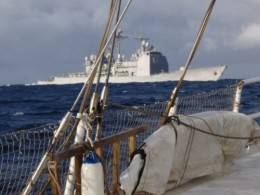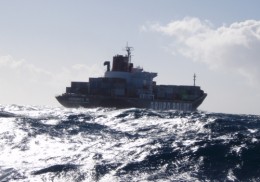South to the Canaries
This is page 3 of a 4 page article.
If you haven't read the earlier pages, please start from the beginning.
PART III – CLOSE ENCOUNTERS
Our new book, A Family Outing in the Atlantic, begins on December 25th, and it begins in almost exactly the same place that we found ourselves, twenty years later, on that same auspicious morn – but not, I am pleased to say, with the same weather. That time, we were battling along in a gale. This time, while the rest of the world was eating turkey and unwrapping presents, Mollymawk was drifting along under a blue sky in pleasant force two.
Pleasant, except for the fact that it was still on the nose.
Our first Christmas present was the sighting of an orange-brown turtle which we identified as a loggerhead. He looked like a huge and very vivid autumn leaf floating incongruously in the bright blue sea.
The second gift was a beautiful sunset and the mysterious green flash. Nick has already seen the green flash three times before, but for me and the kids it was a first.
On the evening of the 26th the wind began to rise, and by the following morning we were beating into a force five. Poppy retired, once more, to lie beneath my table in the aft cabin; Roxanne and I were also feeling a little bit green around the gills, and so we joined the dog – not actually under the table, but in the adjacent bunk.
Nick sat and gazed at the waves, and Caesar took the helm, but Xoë sat in the forepeak, at her desk, and continued to work on her translation of Ovid. With every roll of the boat her chair slid to and fro, so that she had to wrap an arm around the mast in order to hold station. The other hand held her fountain pen. The boat crashed along through the mounting waves, but our scholar was a thousand miles away, in Rome.
“Coffee, Xoxo?”
“Hmm…?”
One can imagine how it would be if we ever sprung a leak or hit a whale:
“Excuse me, Xoë, but we’re abandoning ship now.”
“Not at the moment, Mummy; I’m busy.”
I was lolling about in my bunk, listening to the whine of the wind in the stays and the slatting of the mizzen leech, when above this noise I heard another racket. There was a familiar clattering in the air. I leapt to my feet and hurried on deck, and, sure enough, a grey helicopter came whirling out of the low clouds and towards us.
It circled us twice – the one word, NAVY, was written on its fuselage – and then with a wiggling motion it waved goodbye and clattered off.

Out on the open ocean, a chopper must mean a ship – and half an hour later a small, pale-grey cruiser came slicing through the waves towards us. What nationality would it be, we wondered? Surely not Moroccan, or else the chopper would have been inscribed in Arabic. Not Spanish, or it would have been labelled ARMADA.
At the last moment the ship altered course to pass close across our bows. Not British, then; no sense of noblesse oblige nor even a proper respect for the international rules of collision avoidance. This was a demonstration of contempt rather than of seamanship.
Our radio was on, but nobody called us, and the men watching from the deck disdained to return our wave. As it passed us by we saw that the little warship was called Leyte Gulf. It was flying the stars and stripes.
That afternoon we had another encounter with a ship, and this one was even less satisfactory. Nick was on watch and he quickly realised that the vessel was set to run us down. It was eight miles distant and on a steady bearing. When it was five miles away and still had not altered course he tried calling it on the VHF, but he got no answer.
People who do not sail often assume that little boats must keep out of the way of bigger ones, but this is not the case – or at any rate, not on the open sea. The law of the ocean highway states that power driven vessels must give way to sail, and this makes perfect sense. For a sailing vessel to alter course is often rather tedious, particularly if it involves gybing and resetting the sails. If the wind is strong and the sea rough, as it was in this instance, altering course can even be dangerous; it might involve placing the vessel beam on to a big breaking sea. For a ship, altering course in open water is never difficult. One press of the button on the auto-pilot, or a little turn of the wheel, and the job is done.
(NOTE: The only exceptions to the rule are minesweepers trailing their tackle, fishing boats tending their gear, and other vessels which, for one reason or another, are even less able to manoeuvre than a sailing boat.)
Since the ship failed to alter course, and since we did not want to have to tack, we bore away towards him and ran downwind, parallel to his course but in the opposite direction. This was not the correct, textbook manoeuvre. According to the rules, the ship ought to have altered course by turning to starboard and passing under our stern, and when he failed to do so, we, in avoidance of the collision, should also have altered to starboard, turning away from him. The thinking behind this is obvious: if the ship had suddenly spotted us, at the last moment, and taken action in the correct manner, we, by our manoeuvre, would actually have confounded his attempt to steer clear. However, we could see that, even if he cut his engines, there was no time or distance left for the ship to turn and pass under our stern, and it seemed to us that this was the quickest and easiest way to get clear.

The ship continued merrily on its way. It’s name was Veronica B. It’s port of registry was Santa Cruz de Tenerife. The words GRUPO BOLUDA were painted on its hull in letters as high as our masts.
As it steamed past on its invisible rails less than half a mile away, Nick had one last try at calling the vessel on the radio – but, again, there was no reply. There was no one on deck. Through the glasses we could see that there was no one in the bridge either. The ship was hammering across the ocean at 15 knots, blithely and blindly. If we had not been keeping good watch ourselves, and if we had not altered course, it would certainly have hit us. Very possibly we would have been sunk without trace, and the world would have said, “Home-built boats are not safe, you see.”
We will certainly be reporting this incident – if we can find anyone to report it to – and if the ship happens to be in harbour when we visit Tenerife we will certainly be wanting a word with her captain.
